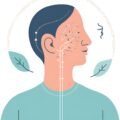Have you ever had a gut feeling that just wouldn’t go away? Maybe you were about to enter a new relationship, and something felt off. Or perhaps you stood in front of a career opportunity, feeling anxious. These moments often lead to a decision: heed that warning or ignore it. What if we told you that your intuition—your gut feelings—can actually be a powerful tool for mental health?
What Is Intuition?
Intuition is often the ability to understand something instinctively. It doesn’t require conscious reasoning. It’s that little voice in your head, a whisper of insight. This inner compass has guided our ancestors in survival. Now, it can help us navigate the complexities of modern life and mental health.
The Science Behind Gut Feelings
Did you know your gut and brain are in constant communication? The gut is sometimes called the “second brain.” It has a vast network of neurons that line the gastrointestinal tract. This network, known as the enteric nervous system, talks to your central nervous system. This interaction plays a crucial role in your emotional well-being.
When you face stress or anxiety, your body produces chemicals and hormones. These can create physical sensations, like that fluttering feeling in your stomach. These sensations inform your intuition and guide your decisions. So, when you have a gut feeling, it’s often your body signaling based on past experiences and current context.
Cultivating Intuition for Mental Health
How can you harness this powerful tool for your mental health? Here are some practical ways to cultivate your intuition:
- Mindfulness Meditation: Take time to quiet your mind. This helps you become more attuned to your inner voice. Mindfulness practices let you listen to your gut without daily distractions. Imagine yourself floating on a calm lake, feeling serene. This state can help you access those gut feelings.
- Journaling: Write down your thoughts and feelings. This not only clarifies your emotions but also helps you recognize patterns. Have you ever reread your journal and thought, “I really knew what I was feeling”? Journaling makes it easier to spot those intuitive nudges.
- Trust Your First Impressions: Next time you meet someone new, pay attention to your initial feelings. Do you feel drawn to them or put off? Learning to trust those first impressions can guide you in making decisions that fit your authentic self.
- Engage in Creative Activities: Creativity unlocks intuitive thinking. Whether you paint, dance, or write poetry, engaging in creative activities opens the door to deeper self-awareness. Think of your creative pursuits as a dance with your intuition. The more you practice, the more fluid your movements become.
Intuition vs. Fear: Knowing the Difference
It’s essential to know the difference between intuition and fear. Fear can show up as anxiety and self-doubt. It clouds your judgment. In contrast, intuition feels calm and centered. When you trust your gut, it’s a quiet assurance, not a frantic rush. The next time you face a decision, take a moment to breathe and tune into your body. This helps you distinguish between these two feelings.
Real-Life Examples of Intuition in Action
Let’s lighten the mood with some real-life stories. Picture this: You are considering a new job. You aced the interview and received a great offer. However, something feels off. After some soul-searching, you realize the company culture doesn’t fit your values. Trusting your gut, you decline the offer and later find a role that feels just right. Your intuition was spot on!
Alternatively, consider a scenario where you wanted to skip a party. Eventually, you decided to go. At the gathering, you connected with an old friend who offered you a fantastic opportunity. If you had ignored that little voice urging you to go, you might have missed out on something great.
Enhancing Decision-Making with Intuition
Intuition is not just about avoiding bad situations. It can also enhance decision-making. When faced with choices—especially those involving your mental health—take a moment to reflect. Ask yourself questions like, “Does this decision feel right?” or “What does my body say?” These reflections can lead you to decisions that resonate with your true self.
The Future of Intuition in Mental Health
As we explore mental health, the role of intuition is likely to gain more attention. Emerging therapies may focus on strengthening this connection between gut feelings and mental well-being. Imagine workshops designed to enhance intuitive skills through art, nature, and community. These could transform how we perceive our internal guides.
By embracing and nurturing your intuition, you empower yourself to make choices that resonate with your authentic self. Trusting your gut can lead to improved mental health, greater self-awareness, and a fulfilling life. So, the next time you feel that gut instinct tugging at you, remember: it’s not just a feeling; it’s your mind and body working together to keep you on the right path.
































No Comments
Leave a comment Cancel